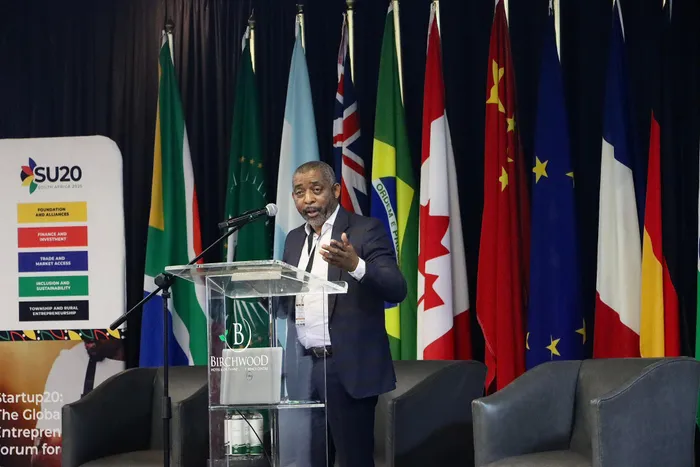South Africa aims to shape the future of entrepreneurship in global startup ecosystem
SMEs

Vuyani Jarana, chairperson of SU20, provided a concise overview of the StartUp20 engagement group within South Africa's G20 Presidency, highlighting the country's vast ecosystem. Jarana was speaking at the StartUp20 (SU20) Midterm Engagement Meeting in Ekurhuleni on Monday.
Image: Supplied
South Africa has positioned itself to take a leading role in shaping the future of entrepreneurship and innovation within the global startup ecosystem.
This was revealed on Monday by the Department of Small Business Development (DSBD) at the StartUp20 (SU20) Midterm Engagement Meeting as part of the first-ever Global Small and Medium-sized Enterprises (SME) Ministerial Meeting organized by the International Trade Centre, the UN small business agency, in partnership with the South African government.
Minister of Small Business Development, Stella Ndabeni, said the Engagement Group was unwavering in its mission to propel innovation, digital transformation, and policy collaboration.
Ndabeni said this initiative aims to forge robust connections between global startup communities, ultimately better equipping local enterprises to navigate international markets.“We have identified five priority areas for the StartUp20 Engagement Group.
“First, Foundation and Alliance with the focus on enabling policies, and ways to build a more supportive and resourced eco-system for early-stage entrepreneurs and scale-ups,” Ndabeni said.
“Second, Finance and Investment with the focus on addressing gaps in early-stage financing, cross-border financing, and ways to derisk investment, for underserved regions and groups like women and youth, including through pre-investment capital readiness support. Third, Inclusion and Sustainability with the focus on circular economy models, green innovation incentives, and pre-investment business support for youth and women led enterprises to improve capital readiness.
“Fourth, Market Access with the focus on facilitating international trade, enabling e-commerce, reforming public procurement systems and supporting regional integration, and fifth, Township and Rural Entrepreneurship with the focus on strengthening local value chains, improving infrastructure and connectivity, and improving access to finance and eco-system support for supporting co-operatives and micro enterprises.”
Ndabeni said the establishment of Task Teams composed of both South African and international stakeholders marked a significant step in this collaborative venture, allowing for the exchange of policy recommendations and best practices.
These discussions are crucial as they lay the groundwork for a clear action programme to be finalised at the upcoming Startup20 Summit on 13th and 14th November, which will also host the inaugural Startup20 Awards to highlight the best startups and ecosystem enablers from G20 nations.
Salome Baloyi, acting chief operations officer and G20 engagement lead coordinator for South Africa's G20 Presidency, shared insights on the StartUp20 initiative.
“Our mission is to empower township and rural communities by breaking down barriers for small businesses, driving structural reforms, and accelerating digital innovation,” Baloyi said.
“We're pushing a bold agenda for startup and MSME development, prioritizing innovation, inclusion, and meaningful participation across all sectors.”
Vuyani Jarana, chairperson of SU20, provided a concise overview of the StartUp20 engagement group within South Africa's G20 Presidency, highlighting the country's vast ecosystem.
“South Africa, as a member of the G20, participates in an international forum comprising 19 countries and two regional bodies, namely the European Union and the African Union,”Jarana said.
He further noted that the primary objective of this international forum is to enhance multilateral cooperation, with a focus on recovering the global economy, stabilising global financial systems, promoting sustainable long-term growth, and strengthening international economic governance.
Nkosi Khumalo, MTN general manager for SME and indirect channels, said they were partnering with various sectors to support small enterprises, drive innovation, and sustainability.
“As the MTN Group, we have invested in 4G and 5G technology to support businesses, developed a fintech platform to support small businesses with insurance capabilities and payment options, and leveraged powerful machines to assist small businesses,” Nkosi said.
“We develop innovation, offer digital skills, and certify businesses to position them for opportunities and contracts, such as those in Information Technology. We are also empowering black female business owners to ensure small businesses stay online.”
BUSINESS REPORT